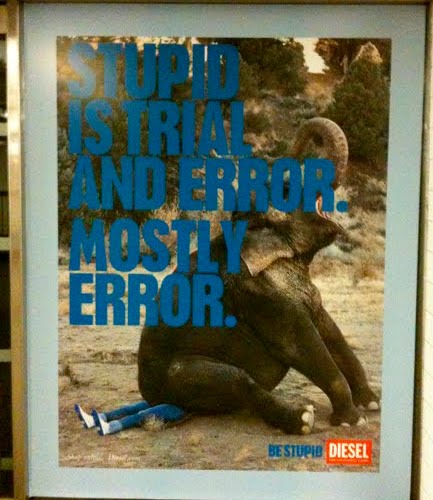-
Anti-Intellectualism is the New Black
by Jessica Loudis January 21, 2010

In case there weren’t enough offensive things already lurking in the New York City subway system, Diesel is ringing in the new year with an ad campaign that exhorts viewers to “Be Stupid”, unironically suggesting that the best way to live life to the fullest—aside from paying $300 for a pair of pants—is to taunt Bengal tigers, ride bikes backwards, or somehow find yourself sprawled beneath a reclining elephant.
Barring a trip to the Bronx Zoo, some of these activities are more viable for New Yorkers than others.
The ads, which are plastered all over downtown Manhattan, feature large block text paired with images of people doing defiantly stupid things. In addition to angering elephants, Dieselites start bonfires on beaches, don traffic cones as hats, and have an inexplicable proclivity for mooning cameras. Accompanying text boldly celebrates the cult of stupid with cryptic, tautological phrases: “You can’t outsmart stupid,” “smart had one good idea and that idea was stupid,” and of course, the eponymous urging: “Be stupid.” (If French Connection is any indication, a line of “Be Stupid” t-shirts would be a big hit among wealthy Euro-hipsters). True to form, slogans require that viewers don’t think too hard, instead channeling the energy of a drunken frat boy rallying a crowd before leaping off a roof.

Putting an unconsciously Nietzschean spin on high fashion, the campaign pits ‘stupid’ against ‘smart’ in the same way that creativity is often pitted against cliché or action against thought. “Smart critiques. Stupid creates,” one ad announces, featuring a group of young fashionistas who have foregone critique in order to sit in lawn chairs arranged to appear as if they’re resting on the side of a wall. Other ads strike an explicitly more Bush-era tone: “smart listens to the head, stupid listens to the heart.”
The Diesel website reveals that the campaign was inspired by company founder Renzo Rosso, a man whose ideas about advertising are perhaps as distressed as his jeans. In the campaign’s manifesto, Rosso attributes the brand’s success to his “stupid” 1978 move of selling jeans designed to look used. “It’s a sign of innovation,” Rosso says. “When you are already doing the things nobody even thinks about.” On the campaign’s homepage, Rosso equates stupidity with creativity (artists and musicians are upheld as examples, no word on writers) and issues a call to the stupid for possible inclusion in a Diesel music video.
Forgetting its strategy for a moment, I have no objections to the campaign’s intent. The Great Recession is supposedly waning, and Diesel wants its customers (and the unsuspecting riders of the Metropolitan Transit Authority) to come out of their financial bunkers and embrace life and credit limits once again. Diesel’s got a business to run, and the ads are topical, if bracingly anti-intellectual. As a whole, the campaign makes a valiant attempt at setting itself up as a counterpoint to cautionary thinking and risk-averse behavior. I guess in this sense, the fact that the message often comes across as muddled only helps. But sticking with the Bush 43 trope, where the campaign goes wrong is in message-control. Diesel’s efforts to rebrand “stupid” don’t quite work, and instead leaving viewers baffled and vaguely insulted. New Yorkers don’t like to be told what to do, much less to embrace willful idiocy as a sign of creative prowess. I, for one, am distinctly less inclined to walk into a Diesel store after being subjected to their copy on a subway ride home. Ultimately, for all the marketing, I suspect that the only people actively living up to the campaign’s plea are Diesel executives.


1 Comment
Anti-Intellectualism is Stupidity – Part 1 :Jeph and Craig's Podversations
[...] this mindset being absorbed from a culture that is infatuated with stuff like Jackass? Could it be that stupidity is actually becoming trendy and the Church has adopted [...]